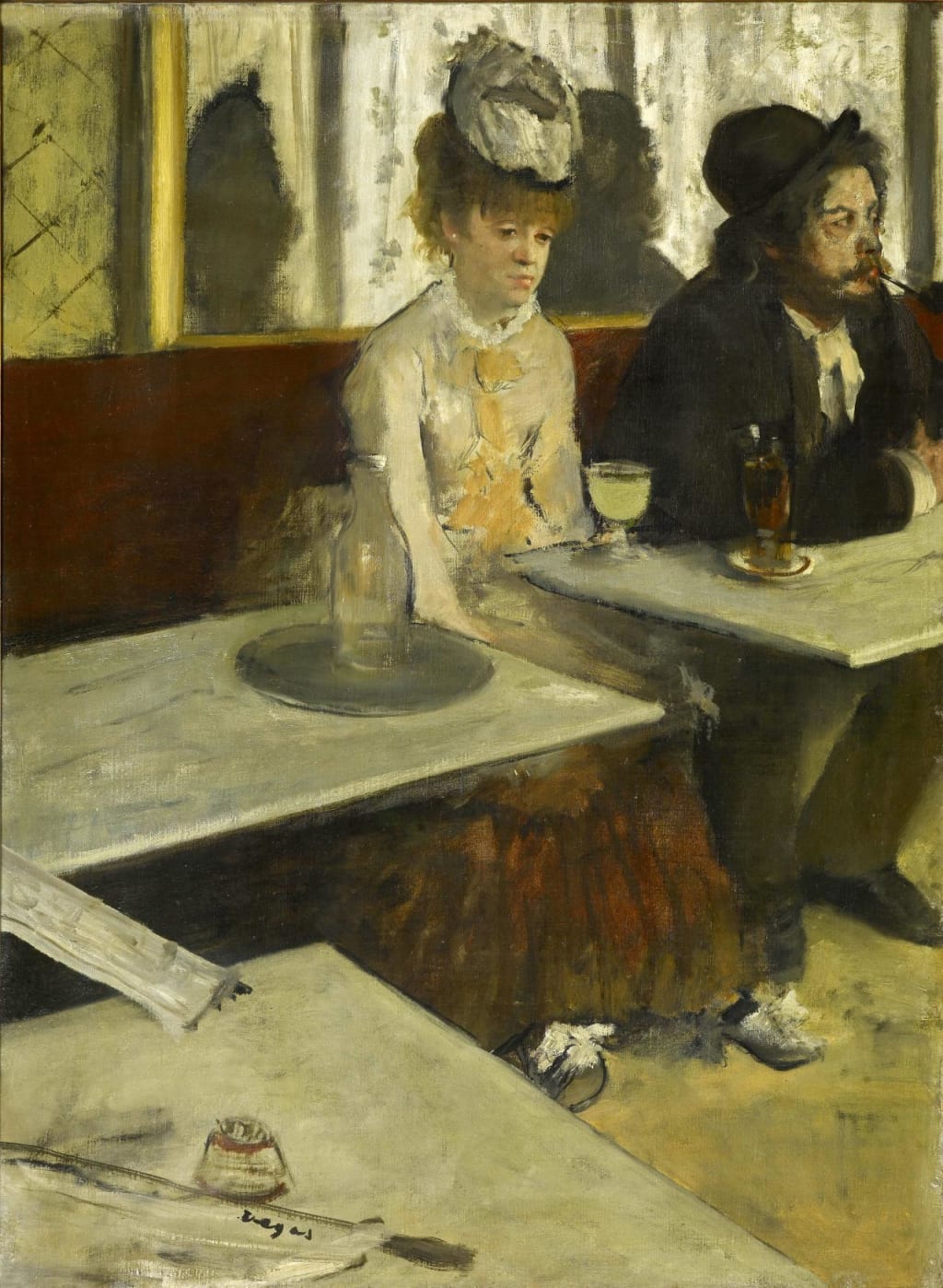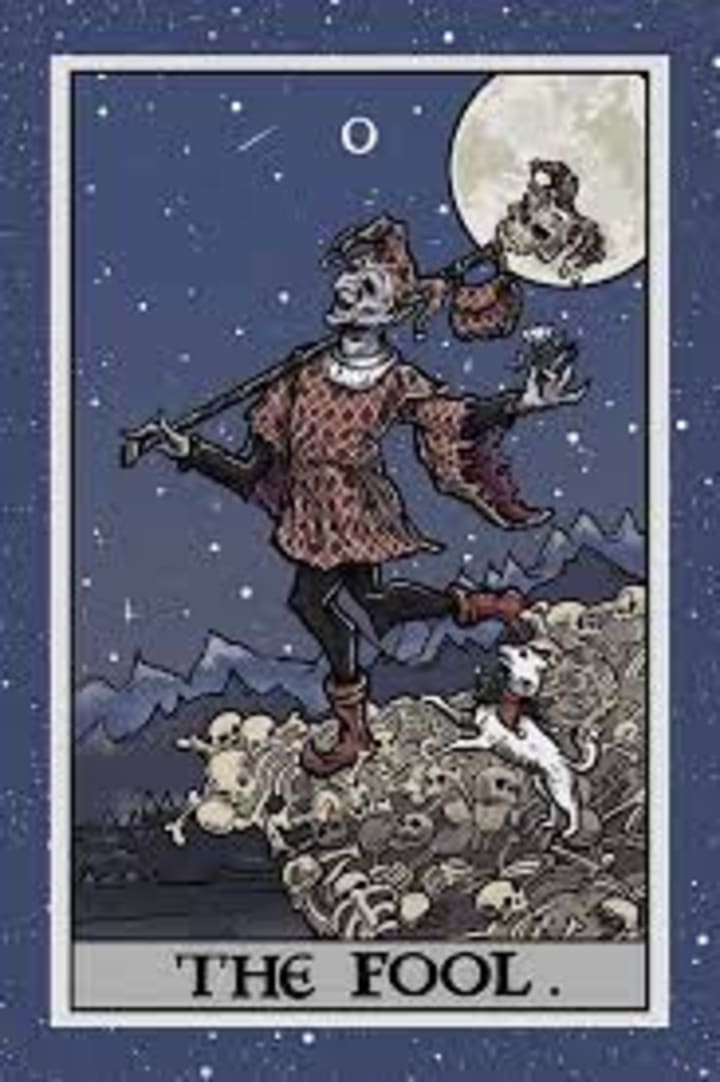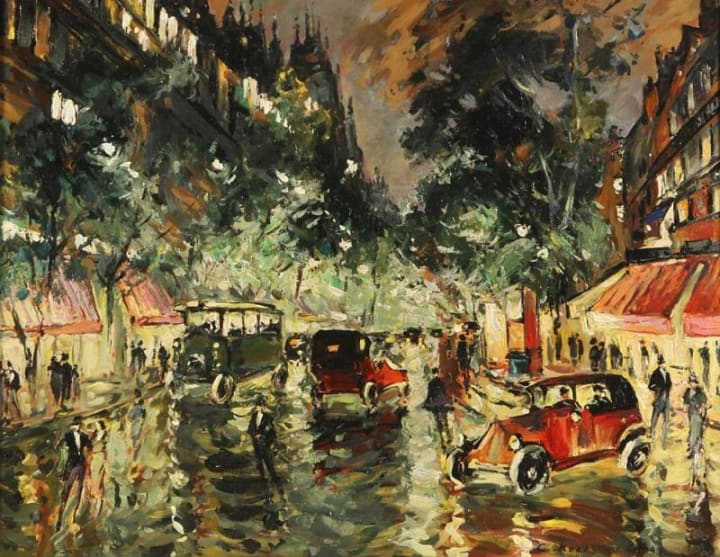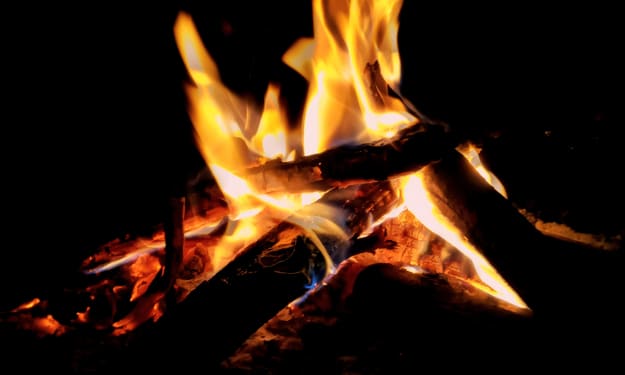The Absinthe Drinker and the Tarot Deck
1890s Paris. He and Them. An eerie tale of tarot, absinthe, and gender empowerment.

Someone is burning the rosemary.
That’s the first thing They think, pushing open the heavy oak door and coming in from the rain. Meat is broiling back of house and someone has burned the rosemary.
Next it’s the dirtiness of the vinyl floors: shriveled ends of old tea leaves, pastry crumbs, the cracked edges of ancient stains, puddles of wine and beer.
Is this the right bar?
Then they see it: an old deck of cards wedged under one leg of the only empty table, a low-top set against the wall. They approach and sit down.
The room is packed with drinkers. Every table is taken, and a thick knot of people stand at the bar. To Their left, dull cold rain falls behind the windows. Someone on the other end of the room booms with laughter. The noise encourages the others to raise their voices.
They lean back against the booth, which is sticky. The wallpaper above it brushes against Their hair and hat. Sitting there in a gold and white lace dress tucked into a brown skirt, in that ridiculous hat, They feel in disguise.
They’ve always felt disguised by gender. But in a crowded room of strangers, feet on a dirty floor and the odor of burned rosemary and alcohol wafting through the air, tonight the disguise makes Them feel safe, They can recede into the costume and disappear like a furtive bird in a high tree.
*
The big oak door opens, bringing in a sheet of rain and Him.
He pauses on the threshold. A few revelers holler at him to shut the door. In His hands He toys with an old white cravat. Finally He looks up, spies Them, approaches and slides into the booth, pushing Them over almost to the next table. The white-bearded man there gives Them an impatient look. The corgi by his feet yelps.
“Salut.” He shoves the white cravat into his vest and pulls his jacket close. “Cold.”
He pulls a cigarette from a coat pocket and lights it. “Something’s burning,” He remarks.
“Rosemary,” They say.
“Rosemary.” He scratches absently at the cravat and looks around at the drinkers, the wallpaper, the bar, the windows. “Anyone been by yet?”
“No.”
As if on cue a boy approaches the table with a towel over his arm and a thick plane of sweat covering his forehead. The boy is met with a volley of derision.
“The dullard finally approaches!” laughs He, leaning forward. “To have kept a lady waiting for so long. Ass! Pig! Duck!”
“I apologize, madame,” the boy stammers, bowing. “We’ve had a busy night…”
“Busy, nothing!” He cries, slamming a fist down against the faux-marble. Emotionally tumescent yet ironic to the point of compulsion, He cannot help but laugh through the rage.
The cooks, who had been sneaking drink behind the bar, suddenly runs into the kitchen where he is lit by a flash of fire and barraged by the Romani curses of the other cook. The patrons laugh boisterously.
“Busy, nothing! One is never too busy to say, ‘I will be with you as soon as I can, mademoiselle.’ No?”
“My apologies again, mademoiselle.”
“It’s nothing,” They say. “May I order? I would like—”
“—two absinthes,” He interjects. “And bring the bottle.” The waiter nods again and darts back to the bar.
“What an ass,” He mutters. There is a minute or two of silence during which He toys with the cravat, wipes his nose and relays his fidgety glance around the room. “Ugly place,” he concludes.
“You chose it,” They say.
“Yes, I chose it.” He sounds vaguely proud. “You found the right table, too.”
“Lucky it was empty.”
"It was marked. No one could sit here but us.”
The boy returns with a tray on which sit two tall glasses of pale green liquid and a green bottle; he sets these down on the table. A cloud of anise fragrance overtakes the bitter odor of the rosemary (the French cook and the Romani cook are arguing passionately about the burn, to the amusement of the patrons; a sizzling pan goes sailing out of the kitchen door and nearly strikes the bartender).
He leans down, tugs the deck of cards out from under the chair leg and tosses it carelessly on the table. They take up the deck and examine the cover of the box: an old witch stands alone on a bare hill and looks back at Them with a warty smile. They pull out one card: a tall knight on a white horse held up a golden goblet.
“Knight of Cups.”
“Nothing gets past you,” He snickers, taking the cards out and shuffling them.
The serving boy carries a tray of beer bottles to a corner of the bar where a group of Belgians sit patiently. He slips on the wet floor; the bottles roll to every corner of the room. They stop one under their foot. Concurrently, the oak door opens and a large group of new revelers enters the bar, filling the space in the middle of the room and demanding immediate liquor. The boy picks himself off the ground and runs to fetch more alcohol. The screams of the two cooks have reached a new pitch. The patrons at the bar no longer laugh; they talk louder to drown out the argument.
He leans in and says over the din, “Are you sure about this?”
“Yes.”
He shrugs and takes a gulp of absinthe. Nods at Theirs. “Then drink.”
They raise their glass and hold it up to the light. The sugar cube at the bottom has nearly dissolved. Pale green. So pale the liquid is almost gold. Through it the firelight from the chandelier takes on a viridescence like water glittering on the walls of a grotto. The taste is bitter.
“I will draw three cards. Just three. Do you accept this?”
They nod.
“First card.” He lays one down flat. “Le Fou. The Fool.”
Suddenly a body falls against their table, grips the edges and steadies itself. A gaunt face and a grin missing both front teeth give the impression of a skeleton. The chandelier light reflects off the top of the absinthe and illuminates the face from below with a green glow, glinting off a silver molar.
“Quelle jolie! A pretty one here, gentlemen!” exclaims the interloper in a Marseilles accent. “And alone! Far too pretty to sit alone. Come join us!”
“No thank you.” Alone? They look to Their left; He has receded so far back into the booth and behind the greatcoat of the man at the next table that he can hardly be seen. Indeed it is as if he’s vanished.
“Join us, mademoiselle! Don’t refuse the polite invitation of a gentleman!”
“There is a gentlemen coming? Tell me when he arrives.”
The skeleton’s mirth turns sour. “Bitch! Pig! Whore!” A young man soiled from head to toe in coal dust emerges from the knot of bodies in the center of the room and pulls him away.
“Coward,” They mutter, as He emerges from the greatcoat (its wearer elbowing him back into place) with a laugh.
“The Fool,” he resumes. “New beginnings. Second chances. Newfound abilities. In gaming it means you can change suit. Do you accept this?”

“What do you mean, do I accept it?”
“Do you?”
“I accept it.”
Suddenly Their body begins to tingle all over. Their skin grows warm, their hair stands on end. As if a million hands are kneading and molding Them, Their flesh starts to change shape. “Drink,” He commands. They grip the absinthe glass so tightly it’s a wonder it doesn’t burst and take a gulp of the bitter liquid. They focus on the milky green color, pour all their thought into it. It is a perfect, endless green, green like newborn envy. Then, as soon as it began, the change is over.
They feel their chest: flat. Their hips, narrow. They look at Him with wide eyes. Expressionless, He draws another card and lays it on top of The Fool face-down.
He says, not turning his gaze from the deck in his left hand, “Second card.” He flips it over. An angel fills the top half of the card and blows a trumpet at a group of supplicating worshippers prostrate on a featureless landscape. “Judgement. Do you accept this?”
“Yes.”
The boy with the beer with a newly-laden tray approaches the Belgians and sets down their new bottles. One of the revelers in the middle of the room bursts out in indignation: “You! Why are you serving those strangers first? We are still thirsty and haven’t had our liquor yet!”
One of the Belgians protests. “We’ve been here for ages!”
Delighted at a challenge taken up the reveler lunges at the Belgian and grabs him by the collar, in the process knocking the boy down; his head strikes the floor with force. Blood seeps into the grooves between the tiles. The reveler, ignoring the shouts of the Belgians, drags his enemy outside and begins to pummel him on the pavement. A few of the other Belgians follow and try to break up the fight, but some of the revelers chase them and a brawl forms in the street.
“Judgement,” He repeats. “You are lost in self.”
They cannot feel.
Raising their left hand and dragging it across their cheek, They feel nothing. The dress and skirt cover Their body but They felt naked, like being outside on a perfectly temperate day with no wind.
“Drink,” He refills his glass and hers. They drink. Sensation returns to Their body, this time vastly heightened. From toes to hat, everything is a source of intense stimulation. The absinthe on Their tongue is so bitter it’s as if she’s chewing on a wormwood root. The green is intense. Everything is seen as if through emerald glasses. The blood of the boy on the floor is green like sap. The brawlers on the pavement, through the windows, look as if inside an empty wine bottle.
“Last card.” He places it on the table. “The Hanged Man. Upside down to boot.”
No sooner are the words out of his mouth than a great cry of anguish comes from the kitchen which silenced the room. One of the cooks comes staggering out with a knife hilt protruding from his chest. He falls flat on his face. The other runs past him through the crowded bar and out into the street.
“The Hanged Man stands for wisdom, enlightenment, life-change. Upside down, though… What could that mean?”
“What could it mean?”
“Drink.”
There is a mouthful of absinthe left in the glass. It tastes like green fire, a green flash of vision, a death and birth. The room is quiet. Revelers shuffle hastily out, leaving the boy bleeding on the floor and the knifed man slumped against the bar.
*
He’s gone. Where He’d been, only a pair of baggy brown trousers, a shapeless hat, and a black jacket with a white cravat.
They remove Their dress and skirt. They pull the brazier off their bony chest. Pulling Themselves into the new clothes, They take the tarot cards and replace them in the deck, then shove the deck back under the wobbly leg of the table.
Hands in Their pockets, They dart out into the rain and are far away before the gens d’arme arrive.
*
On the table in the now empty bar is a bottle of absinthe. On the label is an image of an old woman standing alone on a bare hill. She grins, and spreads her hand before her as if to say, drink!

About the Creator
Eric Dovigi
I am a writer and musician living in Arizona. I write about weird specific emotions I feel. I didn't like high school. I eat out too much. I stand 5'11" in basketball shoes.
Twitter: @DovigiEric






Comments
There are no comments for this story
Be the first to respond and start the conversation.